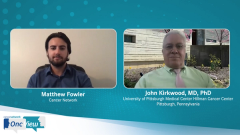
Duration of Treatment for Melanoma
John Kirkwood, MD, PhD, gives his opinion on duration of treatment for patients with melanoma.
Episodes in this series

Matthew Fowler: Duration of treatment can also be challenging to determine. Do you treat indefinitely? When do you consider stopping therapy for a patient?
John Kirkwood, MD, PhD: This is a key question for the field. The question of how long is enough is a question that all our patients ask us. We have to admit that we don’t have rigorous evidence to support the indefinite treatment recommendation that some pharmaceutical companies have advised—speaking of checkpoint blockade immunotherapies, not of BRAF/MEK-targeted therapies. For the checkpoint blockade immunotherapies, either single-agent anti–PD-1 or anti–PD-1 with anti–CTLA4, in the National Clinical Trials Network we’re taking the opportunity to assess patients at 1 year of therapy for their degree of response. This assesses radiographically by CT scan whether tumor has regressed and stayed down; by PET scan whether metabolic activity is absent, say at a year; and if the patient has response. Absent PET activity, it says 1 year of treatment may be enough.
That trial is ongoing in ECOG-ACRIN, and physicians should consider patients for that trial. The opportunity to mitigate the duration of therapy without losing the benefit of the checkpoint blockade is there and needs to be proven. This needs to be done on a trial. It needs to be done with either PET cold disease, CT response in disease, or a biopsy of a mass that may be residual fibrosis without any viable tumor before a patient is removed from therapy, ideally on protocol. This is an issue for the future. It needs prospective trials of discontinuation with those measures I’ve mentioned. With that, we hope we may be able to come to a rational set of guidelines for stopping therapy at response at a year in patients who are asymptomatic and able to enjoy protracted periods of time in continued response without the need of further therapy.
Matthew Fowler: Do you think ctDNA [circulating tumor DNA] could potentially help inform this decision?
John Kirkwood, MD, PhD: Absolutely. There’s no question of that whatsoever. In the National Clinical Trials Network and in institutional trials with a variety of collaborators, this is something that’s being addressed. That needs to be data driven and evidence based going forward.
Matthew Fowler: Do you have any information on how that might happen? Or do you think it’s too early to tell?
John Kirkwood, MD, PhD: It’s too early to tell, but that’s something that we can look forward to in the not-to-distant future.
Matthew Fowler: Perfect. Thank you so much for the time, Dr Kirkwood.
John Kirkwood, MD, PhD: My pleasure. Thank you, Matthew.
Matthew Fowler: Thank you all for watching this CancerNetwork® OncView program from MJH Life Sciences™. We hope you found this to be valuable to your clinical practice.
This transcript has been edited for clarity.
Newsletter
Stay up to date on recent advances in the multidisciplinary approach to cancer.







































